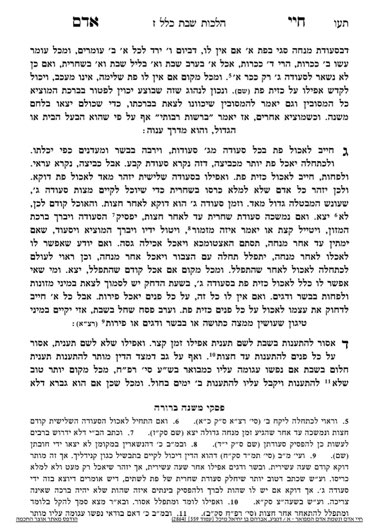The current series, which will cover seudos Shabbos and fasting on Shabbos, is available for sponsorship. Please contact Rabbi Reingold for more information.
We are continuing in siman 3, where the Chayei Adam is discussing the halachos of seudah shlishis. The Chayei Adam writes that one who is unable to eat bread at seudah shlishis, whether because it is unavailable or because they are unable to eat it, can rely on eating mezonos instead of bread. If mezonos is not possible, they should be yotzei with meat, fish or the like. If those are not available, they should be yotzei with fruits. The Chayei Adam clarifies that one is required to push themselves to eat a kezayis of bread, and that is the preferred option over mezonos, meat or fruits.
When erev Pesach falls out on Shabbos, one cannot eat chametz after the fourth hour of the day. On the other hand, they cannot eat matzah on the day of erev Pesach, since Chazal imposed a limitation against eating matzah on erev Pesach in order that a person eat matzah at night with an appetite. The Mishnah Berurah’s opinion is that one should divide up the morning seudah into two meals, eat bread for both of them, and have their seudah shlishis in the morning. Even though it is before the zman for mincha gedolah (because chametz is already assur from the fourth hour), we rely on the one opinion which holds that one can eat seudah shlishis before chatzos. Thus, according to the Mishnah Berurah, the requirement of eating bread is so important, it is preferable to eat bread and eat earlier, rather than not eat bread and eat later in the day.
On the other hand, the Chayei Adam writes that on Erev Pesach, one should eat mezonos; meaning, grind up matzah and make matzah meal cakes, fried foods, or kneidelach which are fried with a significant amount of oil. This process downgrades the food from hamotzi to mezonos. Thus, according to the Chayei Adam, it is preferable to eat later in the day even if one will not be able to eat hamotzi. Alternatively, one could eat meat or fruits, as we learned above.
Even according to the Chayei Adam, if one is eating mezonos, they should eat before the beginning of the tenth halachic hour, in order to keep their appetite for the seder. Although the same concern is not applied by Chazal to meat and fruits, a person should use their judgment in order to enter the seder with an appetite. Eating the mitzvos of the seder with an appetite is considered a hiddur mitzvah.
Summary
One should preferably eat bread at seudah shlishis. If they are unable to, they should eat mezonos. If they are unable, they should eat meat or fish. If they are unable, they should eat fruits.
When erev Pesach falls out on Shabbos, the Mishnah Berurah holds one should eat seudah shlishis in the morning, before the fourth hour, when they can still eat bread. The Chayei Adam holds they should eat after the zman mincha gedolah, and eat mezonos, meat or fruits.



